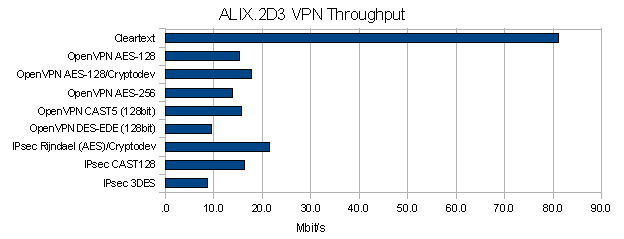Cryptographic Accelerator Support¶
Cryptographic acceleration is available on some platforms, typically on hardware that has it available in the CPU like AES-NI, or built into the board such as the one used on ALIX systems. Add on cards such as those from Hifn are also supported. Any crypto accelerator supported by FreeBSD will work.
Boards utilizing the AMD Geode platform typically have the “AMD Geode LX Security Block” which supports certain encryption types. It will show up in dmesg as the glxsb device:
glxsb0: <AMD Geode LX Security Block (AES-128-CBC, RNG)> mem 0xefff4000-0xefff7fff irq 9 at device 1.2 on pci0
Ensure that the VPN technology to be used is configured for the cipher shown in demsg, likely AES-128-CBC.
AES-NI support via the kernel module requires running an amd64 pfSense® image. It will not work on i386 and will fail with a message similar to:
Dec 4 14:45:05 pfSense kernel: link_elf: symbol AES_GCM_encrypt undefined
Reload pfSense software on that hardware using an amd64 pfSense image and it will work.
Activating the Hardware¶
Some hardware, such as Hifn cards, is active at all times and there is no way to disable it short of removing the crypto card. VIA Padlock and some others are on the mainboard and cannot be disabled.
Others, such as AES-NI or glxsb on ALIX require choosing the appropriate module under System > Advanced on the Miscellaneous tab. Choose the appropriate module to match the hardware for Cryptographic Hardware and then Save. The module will be loaded and available immediately.
To deactivate a loaded module, select None for Cryptographic Hardware, Save, and then reboot the unit.
Verifying Support¶
To see a list of engines and associated transforms supported by the hardware and active modules though OpenSSL, run:
On 2.1.x:
/usr/local/bin/openssl engine -t -c
On 2.2 and later:
/usr/bin/openssl engine -t -c
Example output on an ALIX with glxsb loaded:
: /usr/bin/openssl engine -t -c
(cryptodev) BSD cryptodev engine
[RSA, DSA, DH, AES-128-CBC]
[ available ]
(dynamic) Dynamic engine loading support
[ unavailable ]
Note
That is only for support via OpenSSL. Other areas such as IPsec may support additional methods not listed.
Comparison¶
The difference can be very dramatic, as illustrated in the following example on an ALIX.2D3:
alix:~# openssl speed -evp aes-128-cbc
To get the most accurate results, try to run this
program when this computer is idle.
Doing aes-128-cbc for 3s on 16 size blocks: 977706 aes-128-cbc's in 2.96s
Doing aes-128-cbc for 3s on 64 size blocks: 265799 aes-128-cbc's in 2.89s
Doing aes-128-cbc for 3s on 256 size blocks: 70799 aes-128-cbc's in 2.98s
Doing aes-128-cbc for 3s on 1024 size blocks: 17854 aes-128-cbc's in 2.98s
Doing aes-128-cbc for 3s on 8192 size blocks: 2242 aes-128-cbc's in 2.99s
OpenSSL 0.9.8e 23 Feb 2007
built on: Fri May 15 13:50:54 EDT 2009
options:bn(64,32) md2(int) rc4(idx,int) des(ptr,risc1,16,long) aes(partial) blowfish(idx)
compiler: cc
available timing options: USE_TOD HZ=128 [sysconf value]
timing function used: getrusage
The 'numbers' are in 1000s of bytes per second processed.
type 16 bytes 64 bytes 256 bytes 1024 bytes 8192 bytes
aes-128-cbc 5291.37k 5885.35k 6076.70k 6130.61k 6141.80k
The numbers appear fairly consistent regardless of size, increasing a little with larger chunks.
Now compare this to the results when using cryptographic acceleration:
alix:~# openssl speed -evp aes-128-cbc -engine cryptodev
engine "cryptodev" set.
To get the most accurate results, try to run this
program when this computer is idle.
Doing aes-128-cbc for 3s on 16 size blocks: 110894 aes-128-cbc's in 0.10s
Doing aes-128-cbc for 3s on 64 size blocks: 107049 aes-128-cbc's in 0.11s
Doing aes-128-cbc for 3s on 256 size blocks: 92452 aes-128-cbc's in 0.11s
Doing aes-128-cbc for 3s on 1024 size blocks: 58844 aes-128-cbc's in 0.06s
Doing aes-128-cbc for 3s on 8192 size blocks: 12051 aes-128-cbc's in 0.00s
OpenSSL 0.9.8e 23 Feb 2007
built on: Fri May 15 13:50:54 EDT 2009
options:bn(64,32) md2(int) rc4(idx,int) des(ptr,risc1,16,long) aes(partial) blowfish(idx)
compiler: cc
available timing options: USE_TOD HZ=128 [sysconf value]
timing function used: getrusage
The 'numbers' are in 1000s of bytes per second processed.
type 16 bytes 64 bytes 256 bytes 1024 bytes 8192 bytes
aes-128-cbc 17739.14k 64203.92k 206499.31k 952502.43k 22441871.33k
Quite an increase from before, just shy of a 3694x larger data set processed at 8192 bytes!
Unfortunately, VPNs do not use chunks of data that large, so the difference is not so dramatic in practice
Practical Use¶
OpenVPN¶
To take advantage of acceleration in OpenVPN, choose a supported cipher such as aes-128-cbc on each end of a given tunnel, then select BSD Cryptodev Engine for Hardware Crypto.
Similarly, if the system employs the VIA Padlock engine, choose an appropriate cipher and select VIA Padlock for Hardware Crypto.
Nothing needs selected for OpenVPN to utilize AES-NI. The OpenSSL engine has its own code for handling AES-NI that works well without using the BSD Cryptodev Engine.
IPsec¶
IPsec will take advantage of cryptodev automatically when a supported cipher is chosen. For AMD Geode systems, this is AES with a 128-bit key length, and for Hifn card users, 3DES or others known to be accelerated by the crypto card.
For AES-NI acceleration, use AES-GCM on both sides of the tunnel. (Requires pfSense 2.2)
Benchmarks¶
Here is a chart showing VPN throughput on an ALIX.2D3. Note the higher performance when using the accelerated ciphers with glxsb.

The Hifn accelerator is a much better performer, increasing maximum throughput on an ALIX to around 34 Mbps.